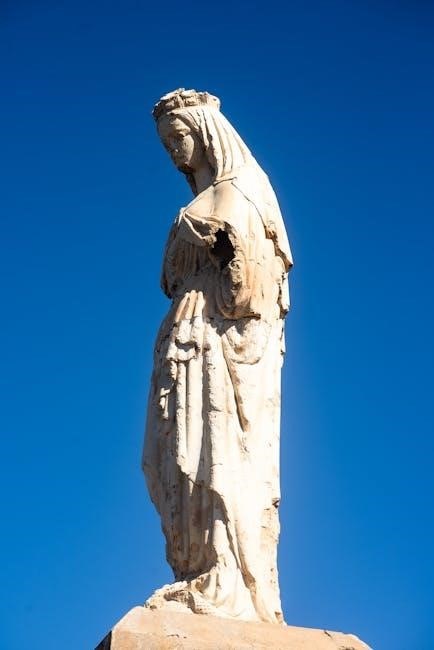medea euripides pdf
- Published
- in PDF
Euripides’ Medea‚ first performed in 431 BC‚ is a gripping tragedy exploring themes of betrayal‚ revenge‚ and injustice‚ making it a cornerstone of Greek drama.
1.1 Overview of the Play
Medea‚ a tragedy by Euripides‚ revolves around the myth of Jason and Medea. First performed in 431 BC‚ it portrays Medea‚ a sorceress and former princess‚ seeking revenge against her husband‚ Jason‚ for abandoning her and their children to marry Glauce‚ the daughter of Creon‚ King of Corinth. The play explores themes of betrayal‚ injustice‚ and ruthless vengeance‚ making it one of Euripides’ most powerful works. Its psychological depth and emotional intensity continue to captivate audiences‚ solidifying its place in the Western literary canon.

1.2 Historical Context
Medea was first performed in 431 BC during the Peloponnesian War‚ a time of great societal tension in Athens. Euripides’ work reflects the cultural and political upheaval of the era‚ exploring themes of identity‚ justice‚ and gender roles. The play was part of a trilogy but did not win first prize at the Dionysia festival‚ highlighting the controversial nature of its themes. Set in Corinth‚ it draws from the myth of Jason and the Golden Fleece‚ offering a unique perspective on betrayal and revenge within a patriarchal society.
1.3 Euripides’ Style and Influence
Euripides’ innovative style in Medea emphasizes psychological complexity and emotional intensity. His use of dramatic dialogue and chorus creates a rich exploration of human nature. Euripides’ focus on strong female characters‚ particularly Medea‚ challenged traditional gender roles‚ making his work groundbreaking. His influence on Western drama is immense‚ with Medea remaining a timeless classic‚ inspiring countless adaptations and interpretations. The play’s themes of revenge and moral ambiguity continue to resonate‚ solidifying Euripides’ legacy as a master of tragic storytelling.

Plot Summary
The tragedy begins with Medea abandoned by Jason‚ who marries Glauce; Medea‚ fueled by rage‚ devises a devastating revenge‚ leading to tragic consequences for all involved.
2.1 Exposition: Medea’s Abandonment
The play opens with Medea‚ a sorceress and former princess of Colchis‚ abandoned by her husband Jason‚ who has married Glauce‚ daughter of King Creon of Corinth. Medea‚ once a loyal wife who helped Jason secure the Golden Fleece‚ now faces betrayal and isolation. Her nurse laments her fate‚ detailing how Medea‚ despite her magical powers‚ is left alone with her two children in a foreign land. This setup establishes Medea’s emotional turmoil and sets the stage for her vengeful actions.

2.2 Rising Conflict: Jason’s Betrayal
Jason’s decision to abandon Medea for Glauce‚ Creon’s daughter‚ ignites the central conflict. Medea‚ once a devoted wife who sacrificed everything for Jason‚ feels deeply betrayed. She reminds Jason of her crucial role in his success‚ particularly in obtaining the Golden Fleece‚ and the sacrifices she made for him. Jason‚ however‚ prioritizes political advancement over his marital vows‚ leaving Medea emotionally shattered and vengeful. This betrayal escalates tensions‚ driving Medea toward her infamous revenge.
2.3 Climax: Medea’s Revenge
Medea’s revenge reaches its peak as she orchestrates a devastating retaliation against Jason. Disguising her intent‚ she sends Glauce a poisoned dress and crown‚ which cause Glauce’s agonizing death. Horrified‚ Creon dies alongside his daughter. Medea then slays her own children to prevent their murder by others‚ a heart-wrenching act driven by rage and sorrow. This climactic moment showcases her mastery of magic and her unrelenting fury‚ leaving Jason utterly destroyed and the audience in awe of her tragic resolve.

2.4 Falling Action: The Consequences
Following Medea’s brutal revenge‚ the consequences unfold with devastating impact. Glauce and Creon perish from the poisoned gifts‚ while Medea’s children are tragically slain by her own hand. Jason‚ realizing the horror of his betrayal‚ is left shattered and guilt-ridden. The palace of Corinth is engulfed in mourning‚ and Medea’s actions spark widespread outrage. Yet‚ she remains unrepentant‚ emphasizing the injustice she endured. The chaos and destruction underscore the play’s exploration of morality‚ justice‚ and the destructive power of unchecked vengeance.

2.5 Resolution: Medea’s Escape
Medea’s escape marks the resolution of the play‚ as she flees Corinth‚ evading accountability for her actions. With the help of her divine father‚ Helios‚ she departs in a chariot of fire‚ symbolizing her supernatural origins and triumph over mortal justice. Despite the carnage she has unleashed‚ Medea remains defiant‚ asserting her victory over Jason. Her escape leaves Jason shattered‚ unable to comprehend the magnitude of her revenge‚ and underscores the play’s exploration of unchecked vengeance and divine intervention.
Major Themes
Medea explores themes of revenge‚ gender roles‚ love‚ betrayal‚ morality‚ and justice‚ intertwining them to reveal the complexity of human nature and societal norms.
3.1 Revenge and Retribution
Revenge and Retribution are central to Medea‚ as the titular heroine exacts devastating vengeance against Jason for his betrayal. Medea‚ abandoned and dishonored‚ channels her anguish into a meticulously planned retribution‚ employing her magical prowess to destroy Jason’s new life. Her actions culminate in the tragic deaths of Glauce‚ Creon‚ and even her own children‚ illustrating the destructive power of unchecked vengeance. This theme underscores the societal injustices faced by women and the severe consequences of oath-breaking in ancient Greek society.
3.2 Gender Roles and Injustice
Gender Roles and Injustice are pivotal in Medea‚ as the play critiques the patriarchal norms of ancient Greek society. Medea‚ a powerful yet marginalized woman‚ challenges the systemic oppression faced by women‚ who were often treated as property. Her abandonment by Jason for Glauce symbolizes the disposability of women in a male-dominated world. Euripides portrays Medea’s rage as a response to the lack of legal and social recourse for women‚ highlighting the deep-seated gender inequalities of the time and sparking moral reflection on justice and equality.
3.3 Love and Betrayal
Love and Betrayal form the emotional core of Medea‚ as the play explores the devastating consequences of Jason’s abandonment of his wife for Glauce. Medea’s profound love for Jason‚ which once drove her to sacrifice everything‚ turns to venomous rage when he betrays their marital vows. Euripides masterfully depicts the psychological turmoil of a scorned lover‚ transforming love into a destructive force. The tragedy underscores the fragility of love and the chaos unleashed when trust is shattered‚ leaving both Medea and Jason forever changed by their shared history.
3.4 Morality and Justice
Euripides’ Medea delves into complex moral dilemmas‚ questioning traditional notions of justice and morality. Medea’s actions as both a victim and a perpetrator challenge the audience to grapple with ethical ambiguity. The play explores the tension between divine and human justice‚ highlighting the harsh consequences of unchecked vengeance. Medea’s pursuit of retribution raises questions about the morality of her actions‚ while Jason’s betrayal underscores the injustice of his choices. The tragedy ultimately leaves the audience reflecting on the true meaning of justice and its multifaceted nature.

Character Analysis
The play explores the complexities of Medea‚ a powerful sorceress and wronged wife‚ Jason‚ the betraying husband‚ Creon‚ the manipulative king‚ and their innocent children‚ victims of fate.
4.1 Medea: A Complex Heroine
Medea‚ a sorceress and former princess of Colchis‚ is portrayed as a deeply complex figure‚ embodying both vulnerability and ruthless determination. Her devotion to Jason turns to rage after his betrayal‚ driving her to seek vengeance. Euripides masterfully depicts her as a multifaceted character‚ blending intelligence‚ magical prowess‚ and emotional turmoil. Her struggle against injustice and societal norms highlights her defiance and strength‚ making her one of the most dynamic and enduring female characters in Greek tragedy.
4.2 Jason: The Betrayer
Jason‚ the legendary hero of the Golden Fleece‚ is depicted as a self-serving betrayer who abandons Medea for political gain. His decision to marry Glauce‚ daughter of Creon‚ reflects his ambition and disregard for his family. Euripides portrays Jason as a man driven by convenience and power‚ unable to acknowledge the sacrifices Medea made for him. His betrayal sparks Medea’s relentless revenge‚ showcasing his lack of empathy and moral accountability‚ which ultimately leads to tragic consequences for all involved.
4.3 Creon and Glauce: The Royal Family
Creon‚ King of Corinth‚ and his daughter Glauce represent the royal family entangled in Jason’s ambitions. Creon seeks to secure his dynasty by marrying Glauce to Jason‚ unaware of the impending doom. Glauce‚ though innocent‚ becomes a pawn in Jason’s pursuit of power and Medea’s wrath. Her tragic fate‚ poisoned by Medea’s gifts‚ highlights the devastating consequences of Jason’s betrayal and the ruthless revenge that unfolds‚ leaving the royal family shattered and bereaved.
4.4 The Children: Innocent Victims
Medea and Jason’s children are caught in the crossfire of their parents’ conflict‚ serving as tragic pawns in Medea’s quest for vengeance. Their innocence and naivety make their fate all the more heart-wrenching. Euripides portrays them as helpless victims‚ emphasizing the moral ambiguity of Medea’s actions. Their deaths symbolize the devastating consequences of unchecked anger and betrayal‚ leaving a lasting emotional impact on the audience and underscoring the play’s exploration of justice and morality.

Symbolism and Motifs

Euripides employs powerful symbols like magic‚ the chorus‚ and the Golden Fleece to enhance emotional and thematic depth‚ exploring revenge‚ justice‚ and humanity’s darker aspects.
5.1 The Use of Magic
Magic in Euripides’ Medea is a central motif‚ symbolizing Medea’s extraordinary power and her ability to defy societal norms. Her sorcery is both a tool for revenge and a reflection of her emotional turmoil. Through her magical acts‚ Medea subverts the patriarchal order‚ showcasing her intellect and determination. The use of magic also underscores the supernatural elements of the play‚ blending reality with myth to create a dramatic and thought-provoking narrative.
5.2 The Role of the Chorus
The chorus in Euripides’ Medea serves as a narrator and commentator‚ providing context and emotional depth. They express collective sentiment‚ highlighting the moral and ethical dilemmas of Medea’s actions. The chorus also offers reflections on justice and humanity‚ creating a bridge between the audience and the characters. Their role is crucial in amplifying the emotional impact of the play‚ while also humanizing Medea’s plight and the tragic consequences of her choices.
5.3 The Symbol of the Golden Fleece
The Golden Fleece‚ a symbol of power and divine favor‚ represents Jason’s quest and ambition. It is the treasure he sought with Medea’s help‚ highlighting her magical prowess and loyalty. The Fleece symbolizes the pursuit of glory and the lengths one will go to achieve it. In the play‚ it serves as a reminder of Medea’s contributions to Jason’s success‚ underscoring her betrayal and fueling her desire for revenge. The Fleece embodies the themes of ambition‚ betrayal‚ and the cost of desire.

PDF Availability and Resources
Euripides’ Medea is widely available in PDF format‚ with various translations and editions accessible online. Popular versions include translations by Gilbert Murray and E. P. Coleridge‚ offering both modern and classical interpretations for readers.
6.1 Where to Find the PDF
The PDF version of Euripides’ Medea can be found on various academic and literary websites. Platforms like Google Scholar and JSTOR often host downloadable versions of the play. Additionally‚ online libraries such as Project Gutenberg and ManyBooks provide free access to classic works‚ including Medea. University websites and digital archives also offer PDFs of the play‚ sometimes accompanied by scholarly introductions and notes. For ease of access‚ the play is also available on platforms like Amazon and educational websites like SparkNotes and LitCharts.
6.2 Translations and Editions
Euripides’ Medea is available in numerous translations and editions; The play has been translated by renowned scholars such as Gilbert Murray and E. P. Coleridge‚ offering diverse interpretations. Modern editions often include critical commentaries‚ historical context‚ and analysis of themes. Some editions feature both the original Greek text and English translations‚ catering to scholars and general readers alike. Digital versions‚ including PDFs‚ are widely accessible‚ ensuring the play remains a vital part of classical literature studies and theatrical productions globally.
